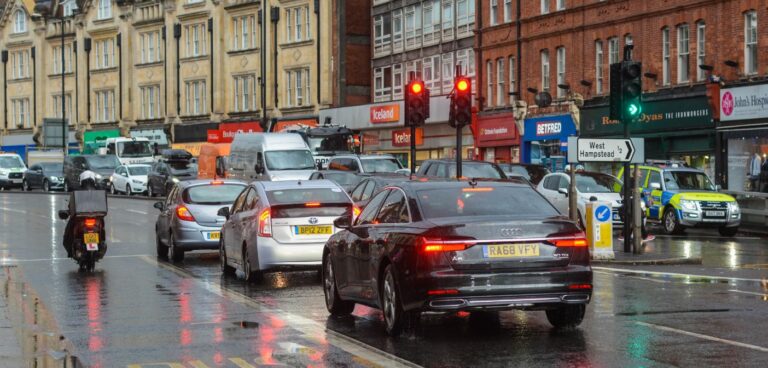Transport for London (TfL) has reiterated its desire to implement a road-user charging scheme that would eventually replace the current Congestion Charge and Ultra Low Emission Zone (ULEZ) in the UK capital.
According to evidence heard during a London Assembly meeting, TfL is bound by the Mayor’s transport strategy to ensure that by 2041, 80% of journeys made in Greater London are by either walking, cycling or public transport.
TfL presented an idea for dynamic road pricing in its consultation on expanding the ULEZ £12.50 daily charge zone from the North and South Circulars to the current ULEZ boundary.
One possible model would use advanced technology in modern cars to calculate how far as well as when and where motorists drive. This information could then be used to charge them in a similar way to a pay-as-you-go mobile phone bill.
READ MORE: 90% of vehicles in outer London now ULEZ-compliant
Christina Calderato, TfL’s director of transport strategy and policy, said: “What we really need to do is move everybody around in a more sustainable way, and that’s a multi-faceted approach, with investment and providing infrastructure for people to make different choices – but road-user charging can be part of how we use your limited road space that we have in London most effectively.”
Discounts would be likely for those who rely on their vehicles, such as disabled people, or there may be peak or off-peak pricing to discourage driving at already congested hours.
READ MORE: Road pricing still “many years away”, admits Mayor of London
Calderato also confirmed that so far any London-based smart road-user charge would not initially replace either vehicle excise duty [VED], road taxes or fuel duty/insurance premium tax, adding that “as is the case in London, we already have charging scheme that sit alongside VED and fuel duty”.
She confirmed there are no current discussions between TfL and the UK government on the issue, with Liberal Democrat assembly member Caroline Pidgeon suggesting that adding the taxes in could make the pricing model more ‘user-friendly’, as there would be one payment instead of up to four.
The TfL lead accepted that it needed to be ‘transparent’ in any implementation of the charge, as public opinion polls have shown the scheme is not yet popular.
READ MORE: Local authorities to challenge London ULEZ expansion decision in court
Calderato explained that TfL wants to introduce the idea of user charging “at the very earliest possible stage” hence its inclusion in the ULEZ expansion consultation, as this can allay any public “fear”.
London is not the only area where a road-pricing scheme may potentially be applied. The committee heard from Transport for West Midlands’ director of strategic partnerships and delivery integration, Sandeep Shingadia, who explained the city-region around Birmingham is looking at a “time-place-distance” model that would charge drivers on those criteria for trips across its region.
You can learn more about the key trends and challenges affecting senior decision-makers who have responsibility for tolling, intelligent transportation systems and road pricing across the world at the 21st annual Road User Charging Conference in Brussels, Belgium on 05-06 March 2024. Click here for more information.





